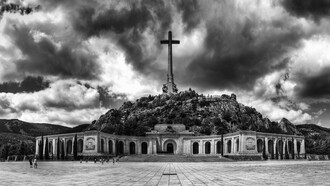In 1960 Chile was shaken by the largest earthquake ever recorded before. Its magnitude was 9.6 degrees on the Richter logarithmic scale, which has a maximum of 10. On October 18, 2019, Chilean society exploded as it had never done, unleashing social energy accumulated by decades of injustice and abuse summed up in two words: inequality and dignity.
2019, the longest year of the 21st century
October 18 will be marked as the start day of changes that nobody knows how they will end yet, but of which there is full awareness that they must be structural and conclude with the approval of a new Constitution, expected for almost 40 years by a significant part of the population. This is how Chileans will end their 2019.
We are facing an unprecedented phenomenon, which will be a subject of study for a long time because the State was challenged starting by government, parliament, political parties, judges, police and a long list of institutions that have been surpassed by a gigantic mobilization of people in all cities of the country. The demonstrations went hand in hand with serious episodes of violence that have included looting of stores and supermarkets, destruction of public and private facilities, burning of churches, 27 people killed, 357 with eye injuries of which 23 have suffered injuries or loss of vision, along with police abuses that include undressing and sexual abuse. All of this has been described by international and Chilean organizations as serious human rights violations.
In addition, dozens of police officers have been injured, including two female police officers burned by Molotov bombs in clashes with groups of hooded individuals who erected barricades, and countless attacks performed by criminal mobs at police barracks in the peripheral neighborhoods of large cities. After more than 2 months of the protests, the marches, attended by thousands of people, have not stopped. It is true that they do not mobilize the million and a half that met in one of them during the first weeks, but they have not stopped. Not a single flag of political parties has been seen, only Chilean and Mapuche flags, but an infinite number of slogans and creative phrases that show deep discomfort for all authorities, as well as for the existing political, economic and social system.
Sociologists define with the term "anomie" the contempt for norms, social rules and institutions in a society. That is exactly what it seems to have happened in broad sectors of the Chilean population, especially in the youngest, who stopped respecting political parties, parliamentarians, armed forces, police and the Catholic Church, among many others, whose approval rates among citizenship have collapsed. This is shown by the polls where President Sebastián Piñera appears with 13% support and 79% rejection. 85.5% say they will vote for a new Constitution, 76.9% support the social movement, while 64.9% believe that the marches should continue, and 41% say they have participated in one of them. In relation to violence, 71.8% of respondents express that violence is a reaction to frustration and discontent. Pensions, health and education are the main demands, which does not mean that there is no long list of others, which highlights the condemnation of abuses and business collusion to set prices in a supposedly free market.
The road to a new Constitution
On April 26, 2020, the plebiscite will be held to define whether or not Chileans want a new Constitution. To do this they must answer three questions:
- Want a new Constitution, YES or NO;
- Constituent Convention: made up exclusively of popularly elected members, YES or NO;
- Constitutional mixed convention: Integrated in equal parts by popularly elected members and parliamentarians or parliamentarians in office, YES or NO.
If the new Fundamental Charter is approved, it must be ratified through a referendum that will immediately cease the current 1980 Constitution, drafted between closed doors during the Pinochet dictatorship. Among the agreed clauses for the approval of the new rules, it is indicated that it must have 2/3 of the delegates for approval. The toughest right sector, which is part of the government coalition, has already said it will vote against a new Constitution; it also opposes to the gender parity of constituents and a percentage of seats reserved for indigenous minorities.
Chilean social apartheid
When we talk about inequality I mean the existence of two worlds that have lived together since the establishment of the economic model bequeathed by the military dictatorship, where the concept of solidarity disappeared and with it a system based on individualism was established where education, health and pensions are determined by income. Dignity, because economic differences and the absence of health and education systems to which everyone has equal access, have created parallel worlds, segregated cities and with it, a kind of social apartheid. This has been seen in the days of protests, especially in the capital, Santiago, where, while in the popular sectors barricades were erected and looting took place, in the well-off sectors many bars and restaurants continued to operate almost normally.
The truth is that this structure is more or less common in Latin America and stems from the time of Spanish colonialism and the emergence of independent republics formed by the descendants of the Spanish themselves and European immigrants who imposed themselves on indigenous cultures. In the land ownership structure, the monopoly of trade and exploitation of natural resources underlies a model of domination that included land theft and the strong alliance between the dominant minority and foreign capital. The Pinochet dictatorship and the establishment of extreme neoliberalism ended with the few instances where people from different social backgrounds could come together, such as public universities. Today they continue to exist, but since 1980, together with the privatization of companies, private universities flourished, and today there are 34 institutions with diverse levels of quality of education on the market.
It is worth remembering that, according to the OECD, the annual cost of higher education in Chile is the second highest - in proportion to income, obviously - after the United States. Socio-economic surveys show that 64% of the Chilean population is defined as belonging to the middle class - differentiated in low (63.1%), medium (26.7%) and high (10.2%) - with income that oscillates between € 731.74 € 1,826.19 and € 4,446.46 respectively, for families of 4 people, which is a big jump compared to 30 years ago. In any case, the middle sectors are still very vulnerable, fearful of falling back into poverty in times of economic crisis, and it is precisely these who demand greater protection from the State.
The violence
With the exception of the Pinochet dictatorship (1973-1990), a similar degree of violence was never seen in Chile like the one observed in the last two months. Since Thomas Hobbes wrote the Leviathan in 1651, it was enshrined that it is the duty of the State to guarantee the safety of people, public services and property to avoid the "state of nature" or the "war of all against all." However, each generation has experienced violence to a greater or lesser extent and almost always responses were developed that may take time, but they do arrive. The history of the world demonstrates this, beginning with the violence of slavery, racism, the consequences of despotic regimes that have caused revolutions which in turn have been responsible for exercising violence against the population. The totalitarianisms of the twentieth century in Europe, the horrors of Japanese imperialism, Pol Pot in Cambodia, the Americans in their wars in Vietnam, the Middle East and other places in the world; South African apartheid, the terror of the violence of the State of Israel, the fundamentalism of the Ayatollahs in Iran, the shame for humanity which is the Saudi Arabian regime, that of the French in Algeria, the Rwandan genocide of the Hutu rulers against the Tutsis, or extreme Latin American violence where the State is the great abuser, as has happened in all the countries of the region.
Governments, therefore, are responsible for the order and security of their citizens and when they fail, as in the Chilean case, social protest overpowers them. To this were added the hesitations and lack of vision until today of President Sebastián Piñera in understanding the depth of the protests and the absence of immediate responses in political and economic terms. Let’s recall that the president said on television that the country was "at war", so he ordered the military to take to the streets. The marches, protests and outbreaks of violence have not disappeared despite the package of economic measures that the government subsequently announced. Everyone acknowledges today, sotto voce, that, if the government opened up to a change in the Constitution and to renounce a good part of its government program, it was due to the massive protests and violence that various groups unleashed that are not yet fully identified, but it is suspected that they are anarchists, radicalized youth, drug traffickers and common criminals who have taken advantage of the masses on the streets.
In the long evolution of humanity, violence has always been present and has not been oblivious to the great social transformations or, as the Spanish writer, Aníbal Malvar says:
Violence? Yes. When a State trespasses, the people also trespass. They have always done it. It is in their historical right. It is the old tradition of self-defense. Afterwards, sometimes you win and sometimes you lose. In short: it's History, buddy.
In contemporary times, only societies that have resolved the relationship between capital and labor in their early days, violence today practically does not exist, as is the case in the countries of northern Europe and Sweden in particular. There, in 1938, businessmen, workers and government signed the so-called Saltsjöbodet Agreements where the foundations of the Welfare State were laid, which favors all, delivers equal opportunities, dignity and respect, and with this they have guaranteed social peace. From the French Revolution to the present day we see that violence does not disappear in countries by a law or by putting more police in the streets. Chile has a long history of killing workers, especially during the twentieth century, also occurred in democracy. After the imposition of the extreme neoliberal model during the Pinochet dictatorship and that it was not possible to modify due to the obstinacy of the right to maintain it, the country is experiencing an explosion of simultaneous demands that make it very difficult for those who govern to satisfy all. Worse is not being fully aware of the depth of the change and the conditions that people demand and cling to an economic model already surpassed by history.















